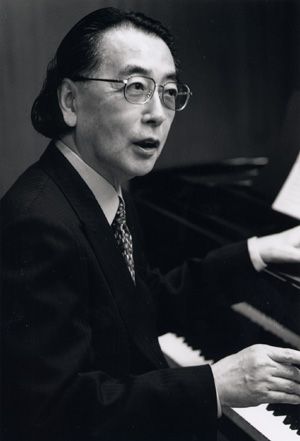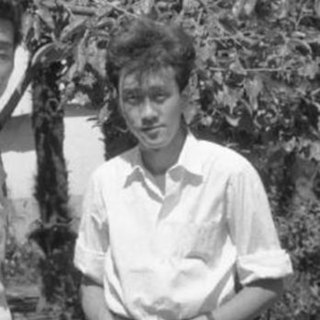Related Research Articles

A shakuhachi is a Japanese longitudinal, end-blown flute that is made of bamboo. The bamboo end-blown flute now known as the shakuhachi was developed in Japan in the 16th century and is called the fuke shakuhachi (普化尺八). A bamboo flute known as the kodai shakuhachi or gagaku shakuhachi (雅楽尺八) was derived from the Chinese xiao in the Nara period and died out in the 10th century. After a long blank period, the hitoyogiri shakuhachi (一節切尺八) appeared in the 15th century, and then in the 16th century, the fuke shakuhachi was developed in Japan. The fuke shakuhachi flourished in the 18th century during the Edo period, and eventually the hitoyogiri shakuhachi also died out. The fuke shakuhachi developed in Japan is longer and thicker than the kodai shakuhachi and has one finger hole less. It is longer and thicker than hitoyogiri shakuhachi and is superior in volume, range, scale and tone quality. Today, since the shakuhachi generally refers only to fuke shakuhachi, the theory that the shakuhachi is an instrument unique to Japan is widely accepted.
Takashi Yoshimatsu is a Japanese classical music composer. He is well known for composing the score for the 2003 remake of Astro Boy.

Toshi Ichiyanagi was a Japanese avant-garde composer and pianist. One of the leading composers in Japan during the postwar era, Ichiyanagi worked in a range of genres, composing Western-style operas and orchestral and chamber works, as well as compositions using traditional Japanese instruments. Ichiyanagi is known for incorporating avant-garde techniques into his works, such as chance music, extended technique, and nontraditional scoring. Ichiyanagi was married to artist Yoko Ono from 1956 to 1962.
Minoru Miki was a Japanese composer and Artistic director. He was known for promoting Japanese, Chinese and Korean traditional instruments as well as some of their performers.

Teizo Matsumura was a Japanese composer and poet. Orphaned and suffering from tuberculosis, during his recovery in the early 1950s he began to write both haiku and music. He studied with Tomojiro Ikenouchi and Akira Ifukube. He was influenced by Ravel and Stravinsky, but also Asian traditions. He was Professor Emeritus of the Tokyo National University of Fine Arts and Music.
Junsang Bahk is a celebrated Korean composer, also active in Austria.
Hiroaki Zakōji was a Japanese composer and pianist.

Pehr Henrik Nordgren was a Finnish composer.

Toshio Hosokawa is a Japanese composer of contemporary classical music. He studied in Germany but returned to Japan, finding a personal style inspired by classical Japanese music and culture. He has composed operas, the oratorio Voiceless Voice in Hiroshima, and instrumental music.
Akira Miyoshi was a Japanese composer.
Ryōhei Hirose) was a Japanese composer.
Peter Askim is an American composer of modern classical music, conductor, music educator and a double bassist.
Riley Kelly Lee is an American-born Australian-based shakuhachi player and teacher. In 1980 he became the first non-Japanese person to attain the rank of Dai Shihan in the shakuhachi tradition. He is a recipient of two of the most revered lineages of shakuhachi playing, descending from the original Zen Buddhist "priests of nothingness" of the Edo period. His first teachers were Hoshida Ichizan II and Chikuho Sakai II. A later teacher was Katsuya Yokoyama.

Yoshirō Vladimir Irino was a Japanese composer.
Sean Eric Kennard is an American classical pianist.

Barry Ernest Conyngham,, is an Australian composer and academic. He has over 70 published works and over 30 recordings featuring his compositions, and his works have been premiered or performed in Australia, Japan, North and South America, the United Kingdom and Europe. His output is largely for orchestra, ensemble or dramatic forces. He is an Emeritus Professor of both the University of Wollongong and Southern Cross University. He is former Dean of the Faculty of the Fine Arts and Music at the University of Melbourne.
Hifumi Shimoyama is a Japanese composer of contemporary concert music.
James Nyoraku Schlefer, born 1956 in Brooklyn, New York, is a performer and teacher and composer of shakuhachi in New York City. He received the Dai-Shi-Han certificate in 2001, one of only a handful of non-Japanese to receive this high-level award. In 2008, he received his second Shi-Han certificate from Mujuan Dojo, in Kyoto. In Japan, Schlefer has worked with Reibo Aoki, Katsuya Yokoyama, Yoshio Kurahashi, Yoshinobu Taniguchi, and Kifu Mitsuhashi. His first teacher was Ronnie Nyogetsu Seldin. He holds a master's degree in Western flute and musicology from Queens College and currently teaches shakuhachi class at Columbia University and music history courses at the City University of New York. He has performed at Carnegie Hall, Lincoln Center, the Kennedy Center, Tanglewood, BAM, the Metropolitan Museum, at colleges and universities throughout the US and has toured in Japan, Indonesia, Brazil and counties in Europe. Schlefer has four solo recordings, Wind Heart(which travelled 120,000,000 miles aboard the Space Station MIR) Solstice Spirit (1998), Flare Up (2002), and In The Moment (2008). His music has been featured on NPR's All Things Considered. Schlefer's latest recording Spring Sounds, Spring Seas was released in June 2012 and features his original music for shakuhachi and orchestra.
Han Terra is a South Korean–born inventor, composer and musician. She was a child prodigy and was performing by age 6 as a Korean kayageum player beginning her training at the age of 4. She has invented a 24-stringed musical instrument called TeRra incorporating artificial intelligence.

Elizabeth Brown is an American contemporary composer and performer, known for music described as otherworldly, which employs microtonal expression, unique instrumentation and a morphing, freewheeling language. Her work is frequently commissioned for specific ensembles and has been performed internationally in solo, chamber and orchestral contexts at venues including Carnegie Hall, Boston's Symphony Hall, the Smithsonian Institution, and the Hanoi National Conservatory of Music. She has written extensively for flute, unconventional instruments such as the Partch complement and theremin, and the traditional Asian shakuhachi and đàn bầu; she combines them in original ways that mix Western and Eastern, ancient and modern, and experimental and conventionally melodic sensibilities. Composer and critic Robert Carl calls Brown a "gentle maverick" whose avant-gardism bends and subverts traditional tropes with an unironic, unpretentious manner "that is fresh and imaginative, but never afraid of beauty, nor of humane warmth."
References
- ↑ Akio Miyazawa, November 18, 2004, Shimbun Akahata
- ↑ "Honolulu Star-Bulletin News".
- ↑ "Honolulu Star-Bulletin Features".
- ↑ Gregory Shephard, "Pianist's brilliance shines through Rachmaninov Third", January 6, 1998, Honolulu Advertiser
- ↑ Thomas Putnam, "June in Buffalo festival takes a traditional turn", Buffalo Daily News, June 6, 1996
- ↑ Hans-Theodor Wohlfahrt, "Ein neues Darmstadt für die Neue Welt", Neue Musikzeitung, August/September 1996
- ↑ http://www.classicalcdreview.com/1175.html Archived 2013-12-30 at the Wayback Machine , February 2011
- ↑ "Music at Manoa - Faculty - Donald Reid Womack". Archived from the original on 2008-12-22. Retrieved 2008-12-08.